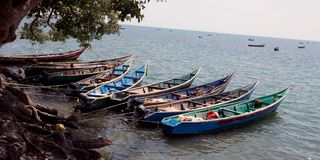42 Kenyan fishermen arrested four weeks ago to be charged in Uganda

Fishing boats docked offshore at a beach on Rusinga Island. 42 Kenyan fishermen arrested four weeks ago by Uganda authorities are expected to appear in court on Tuesday.
The 42 Kenyan fishermen detained in Uganda are expected to appear in court on Tuesday.
They were arrested four weeks ago in Lolwe Island in Ugandan waters as they were fishing and taken to Kampala after their 12 boats were seized by Ugandan authorities.
Mr Julius Odembo, the chairman of Bondo Fishermen Association who traveled to Kampala on Friday accompanied by relatives of the fishermen said the Ugandan authorities had informed them that the fishermen were due to appear in court after being held in custody for four weeks.
Mr Odembo, who doubles as the chairman of the Sirongo Beach Management Unit in Bondo Sub-County, has since appealed to President William Ruto to intervene and have the fishermen freed.
He said the fishermen were being subjected to inhuman treatment.
“Our communication with the fishermen has been difficult because the authorities confiscated their phones. I hope after the court session, we shall also know the amount that each will pay as a fine in order to be allowed to travel back to the country,” said Mr Odembo.
Kenyan fishermen have called on the East African Community to introduce a single license that would allow them to operate anywhere in the lake without being subjected to harassment to help end the perennial conflicts between the fishermen and the Ugandan security officials.
Mr Odembo said the drastic reduction of fish in the lake has affected the fishing business in the region and called on the county government to consider restocking it with fingerlings.
“Fish population has gone down. The government should restock the fish in the lake to increase their population. Today there are fishermen who stay all night in the lake without a single catch,” said Mr Odembo.
Due to the decreased fish population, some fishermen often resort to crossing the boundaries for the catch in the waters in the neighbouring country.
“As a fisherman from Kenya, my livelihood depends on fishing in the lake. I am at times forced to cross the border to look for the fish, without that I will not be able to feed my family. The three countries sharing the water in Lake Victoria can still work together without these constant arrests,” said Mr Joseph Wafula, a fisherman from Obaro Island in Budalangi.
Out of the three East African countries, Kenya has the smallest share of the second largest freshwater lake in the world at only six percent, Tanzania has the largest share of 49 percent while Uganda has 45 percent.
Mr Odembo also appealed to the county government to supply the fish farmers with fingerlings.
“Cage fishing is the new technology that has gained popularity in the region. Those keeping fish in the cages are also farmers, when they supply seeds and fertilizer to the farmers, the fish farmers should at least get free fingerlings,” he added.





